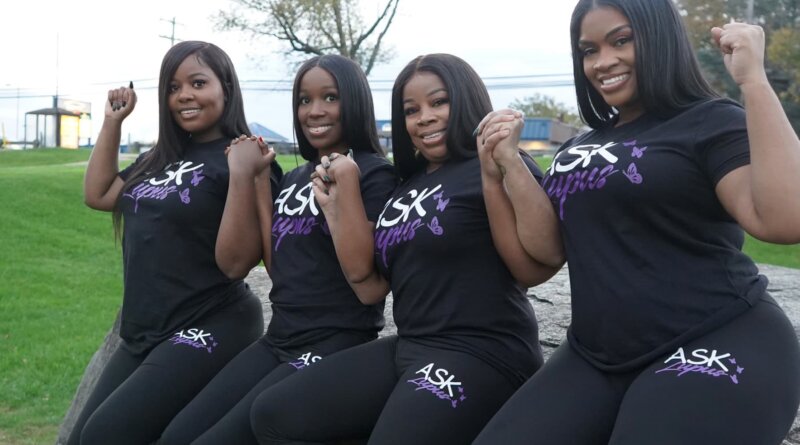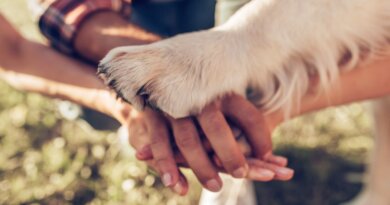Three Sisters’ Nonprofit Champions ‘Lupus Warriors’
Sakeena Trice was 20 when she learned how extensively lupus runs in her family. She was a sophomore then at Morgan State University, and there were days she could barely drag herself across campus; her legs ached, her feet ballooned with swelling, and fatigue sapped her energy.
About the same time, Sakeena’s older sister, Aniysha, was diagnosed with lupus nephritis, which affects the kidneys. Their maternal grandmother had lupus, too, though she didn’t talk about it much; all the sisters knew as children was that she was often in the hospital.
“My mother was never open about her illness,” says Veronica Phillips, Sakeena and Aniysha’s mother, who also has lupus; she was diagnosed 4 years ago. “When my daughters were diagnosed, I thought: Where’s the support? Where do I go? I was given the number of a hotline, but it was so distant, and we were so new to lupus.”
Sakeena remembers feeling scared: Her younger sister, Kareema, also developed lupus-like symptoms, her older sister’s kidneys were failing, and she herself had extreme flare-ups during law school. Once she had a seizure in the classroom. Her pain spiked to ferocious levels; sometimes classmates had to help her get dressed.
At the beginning, she recalls, “We had very little information. We didn’t know what lupus was or how it could affect you: the treatment, the life expectancy. We wanted to create an organization that would spread lupus awareness.”
In 2013, the sisters founded the nonprofit ASK Lupus – forming an acronym with their initials – to provide in-person and online support to those who experience lupus and to the people who love and care for them. They raise funds for lupus research and host events – yoga sessions, networking roundtables – along with every-other-month virtual support groups.
Inside a Lupus Support Group
On a recent evening, 16 women – “lupus warriors” and “lupus supporters” in the lingo of ASK – gathered on Zoom to tell their stories and seek a kind of understanding that is sometimes hard to find from co-workers, classmates, and friends.
“I wish I would have done support groups when I was first diagnosed [in 2014],” said Nicolette. “It’s important to remember that you’re not the only one going through this, that there are other people living it out, and living it out well.”
“A lot of times, we isolate ourselves,” said Devonna, who has had lupus for 14 years. Well-meaning relatives may say, “Hope you feel better!” without realizing, she said, “that there’s never going to be any ‘feeling better.’ This is for life.”
Ayanna, 20, developed lupus during her first week of high school. For her, the diagnosis was a stern wake-up, a reminder to eat a healthier diet, drink more water, and honor her need to rest. “Lupus shouted at me, ‘Listen to your body!’” she said. “I’m in college now, a sophomore. A lot of people here don’t know about lupus. There definitely needs to be more conversation about it.”
‘Some Days, I Need to Be Curled Up in a Ball’
For an hour, the women’s talk wound from exasperation with dismissive doctors to strategies for managing flare-ups. Veronica, mother of the three sisters who started ASK, said she does yoga and runs at least four times a week. “Some days it’s hard for me to push myself to do it. But after the fact, it makes me feel better.”
The women – who hailed from New York, Philadelphia, North Carolina, and elsewhere – were candid about the grim moments. “At one point, Aniysha had cancer, and she shut down emotionally and became really mean,” Sakeena said.
Her sister nodded. “Some days, I need to be curled up in a ball, or I want to cry, but I know lupus is not going away, and it’s something I will have to live with throughout my life. I give myself those moments – to have time, pull my thoughts together, and be able to move forward.”
Then a new Zoom square blinked on: Jasmine, dressed in a flower-sprigged hospital gown. “I’m 25,” she told the group. “I was diagnosed at 17. It’s been a long journey. When the weather changes, I get really bad rashes,” and she held up both hands, marked with scarlet patches. “I get them on the soles of my feet, too; they become like blisters. I’ve had several hip replacements. I’m in the hospital right now; they’re trying to tell me that my ankles may be next.”
Newcomers to the group, including Jasmine, Ayanna, and Érica, received immediate welcomes from longtime members and promises to direct-message them with helpful links and notice of future gatherings. When Érica said she didn’t know anyone with lupus in Brooklyn, Aniysha responded, “I want to link you to a lupus warrior who’s in New York.”
Understanding Despair, Celebrating Resilience
Meantime, the lupus supporters shared what they had learned about being a cousin, co-worker, or friend to someone with the disease. “Lupus support means listening and understanding, having some type of compassion when today is a bad day,” said Akera.
Friends and relatives of those with lupus must also become informed, Tonya said, so that those with the disease don’t bear the full burden of explaining themselves over and over. And Amina, whose daughter was diagnosed with lupus when she was just 13, said, “The main thing is always to remind them not to give up. Be aware of what’s going on in their lives. Reach out.”
The beauty of this group, say the Trice sisters, is that no one has to explain. They all know the language – SLE, or systemic lupus erythematosus; lupus nephritis; discoid lupus, which affects the skin – but more important, they recognize the whole spectrum of lupus experience. They know the despair. They celebrate the resilience.
“One of the hardest things for me was being open, being able to share my experiences without crying,” Aniysha said. “But I would not take back my lupus diagnosis. Without it, I don’t believe I would have the same strength.” She told the group about her recent kidney transplant – good news for a lupus nephritis patient – and how her hands still shake at times because of the ways the disease damages the central nervous system.
“My lupus journey has been a roller coaster,” she said. “You never know what may happen day to day, but don’t disqualify yourself from anything. You are still worthy; you are still powerful.” Then she shared a favorite quote: “I have lupus. Lupus doesn’t have me.” Fifteen women nodded yes.




